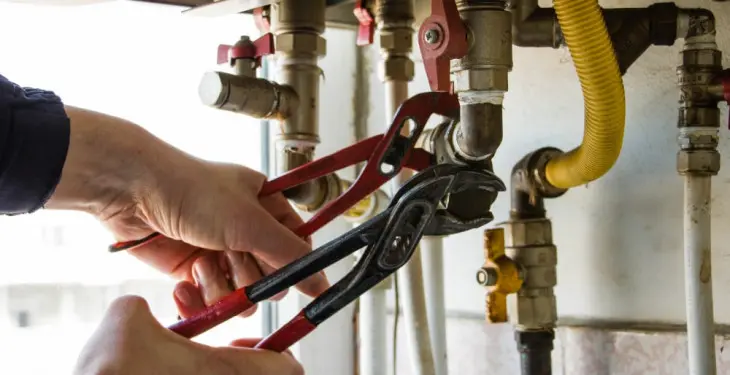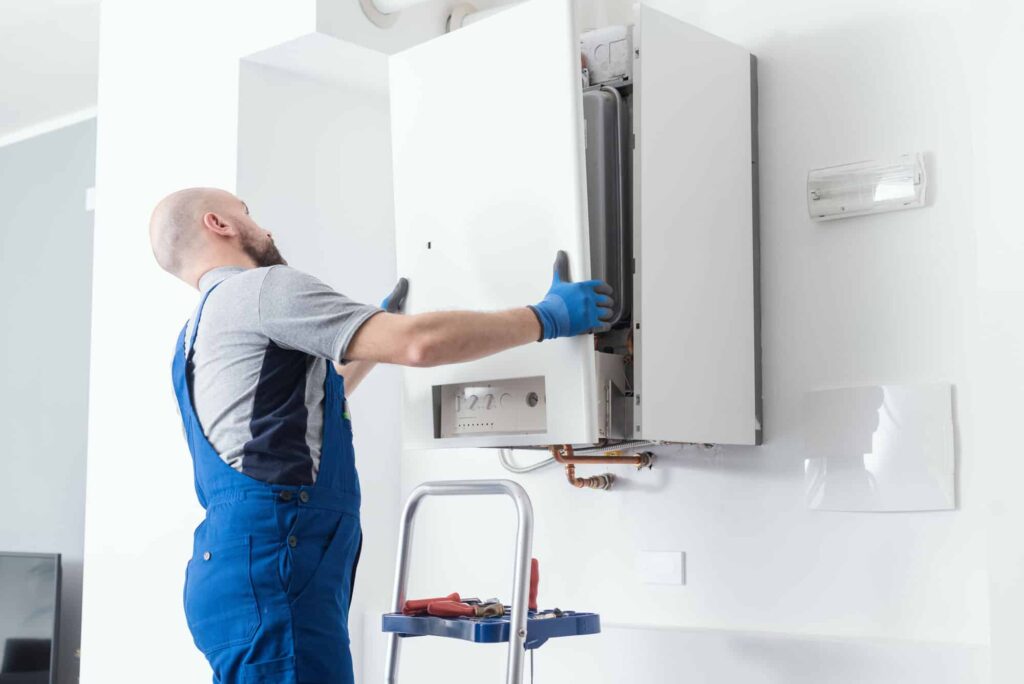A leaking boiler can turn a calm Rhode Island morning into a stressful one. Water on the floor, hissing sounds, or pressure drops are all warning signs that something’s not right.
If you’re wondering whether you can fix it yourself or need professional help, this guide breaks it down simply.
You’ll learn what causes boiler leaks, when repair makes sense, and when it’s time for a replacement — all tailored for Rhode Island homeowners.
How Can I Repair a Boiler Leak?
If your boiler is leaking, turn it off, find the source, and call a qualified technician to repair or replace the faulty part safely.
Key Takeaways
- Shut off power and water immediately if you notice a leak.
- Common causes include pressure issues, corrosion, or faulty seals.
- Repairs are possible for minor leaks, but old or recurring issues may need replacement.
- Prevent leaks with annual servicing and regular pressure checks.
- Acorn Oil offers expert boiler repair, replacement, and installation across Rhode Island.
Why Boiler Leaks Happen in Your Home

Boiler leaks rarely happen without a cause. One of the most common culprits is high pressure. When the system pressure climbs too much, water can escape through the pressure relief valve.
Corrosion is another frequent issue. Over time, rust can eat away at metal pipes or the heat exchanger, creating small holes where water seeps out.
Loose joints or worn rubber seals can also cause minor but persistent leaks. If you spot water around pipe connections, this could be the issue.
In Rhode Island’s cold climate, frozen condensate pipes are especially common during winter, and when blockages force water back into the boiler, many homeowners end up searching for answers about what is furnace maintenance and how to prevent the issue from happening again.
Understanding why your boiler is leaking helps you decide the right next step — whether that’s tightening a fitting yourself or calling in a professional for boiler repair in Rebohoth.
Step-by-Step: Initial Safety & Troubleshooting
Before grabbing any tools, focus on safety.
- Turn off the boiler and power supply: Water and electricity don’t mix.
- Shut off the water supply to prevent further flooding.
- Mop up standing water to protect floors and nearby electrical items.
Next, locate the leak. Check if the water is coming from the bottom of the boiler, the pipe joints, or the pressure relief valve. If your pressure gauge reads above normal (usually around 1.5 bar), you might have a pressure problem.
Feel joints gently for looseness and inspect the condensate pipe outside. In freezing Rhode Island weather, this pipe can clog with ice, causing internal leaks.
If you can’t clearly identify or safely fix the issue, stop there. Call a licensed heating professional. Attempting deeper repairs yourself can lead to bigger problems or void your warranty.
Repair Options & What They Cost
Once a technician inspects your boiler, they’ll determine what’s causing the leak and recommend repairs.
Here’s what typical fixes may involve:
| Cause | Repair Solution | Approx. Cost (USD) |
| Pressure issue | Adjust pressure, replace valve | $100–$250 |
| Worn seal or gasket | Replace part | $150–$300 |
| Corrosion on pipes | Replace the affected section | $200–$500 |
| Faulty heat exchanger | Replace component | $800–$1,500 |
Smaller issues like loose joints or faulty valves are often affordable to fix. But if the leak stems from major parts such as the heat exchanger, the repair cost may approach the price of a boiler replacement.
A skilled professional from Acorn Oil can assess whether repair or full boiler installation is more cost-effective. In many cases, older systems benefit from a new unit that runs efficiently and reduces heating bills.
When to Consider Full Boiler Replacement or New Installation

Sometimes a leak is a sign of deeper problems. If your boiler is more than 15 years old, requires constant repairs, or the corrosion is severe, replacing it could save money long term.
Modern boilers are more efficient and come with warranties that reduce future repair worries. For Rhode Island homes, where winters hit hard, a new boiler installation means reliable warmth and lower fuel consumption.
If your technician recommends replacement, ask about energy-efficient models that match your home’s heating needs.
Acorn Oil provides both boiler repair and boiler replacement services to ensure your system runs at peak efficiency year-round.
Preventive Maintenance Tips to Avoid Future Leaks
The best repair is the one you never need.
Follow these maintenance habits to keep your boiler in top shape:
- Schedule annual servicing by a licensed technician.
- Check boiler pressure monthly and keep it within the safe range.
- Add a corrosion inhibitor to the system water to protect internal parts.
- In winter, insulate external pipes to prevent freezing.
- Keep the area around your boiler clean and dry.
By following these simple steps, you can extend the life of your system and reduce the risk of another stressful leak—especially helpful if you’re already considering professional boiler replacement and installation in East Providence.
Book Boiler Repair, Replacement & Installation Service
If your boiler is leaking or showing signs of wear, don’t wait. A small leak can quickly turn into major damage or higher utility costs.
Acorn Oil offers professional boiler repair, replacement, and installation services across Rhode Island. Our experienced technicians can inspect your system, provide honest recommendations, and restore comfort to your home.
👉 Book your service today at AcornOil.com to schedule a same-day appointment.
Frequently Asked Questions
1. How much does it cost to repair a boiler leak?
Most boiler leak repairs cost between $150 and $500, depending on the part and severity.
2. Can I ignore a small boiler leak?
No. Even a small leak can lead to corrosion, pressure loss, and costly water damage.
3. How do I tell if the leak is from the boiler or nearby piping?
Check for moisture directly under the boiler. If pipes or valves are wet higher up, it may be the piping.
4. How long can I safely run a leaking boiler?
You shouldn’t. Turn it off immediately to prevent electrical hazards or further damage.
5. Does boiler installation take a full day?
Typically yes. Most residential installations in Rhode Island take 4–8 hours.
6. Will a new boiler installation prevent leaks completely?
It reduces the risk significantly, especially when paired with annual maintenance.
7. Is DIY boiler repair safe?
No. Boilers involve high pressure and gas or oil connections. Always use a licensed professional.
Conclusion
Boiler leaks are inconvenient, but they’re also fixable with the right approach. Start by shutting everything off, identifying where the leak comes from, and deciding whether repair or replacement makes more sense.
For Rhode Island homeowners, professional help is just a call away. Contact Acorn Oil today for expert boiler repair, replacement, or installation services. A prompt response not only restores comfort but also protects your home from future damage.